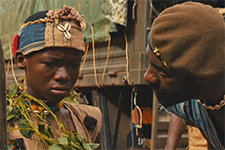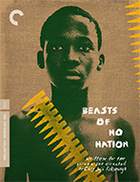Beasts of No Nation
|  Rarely have I seen a film that is simultaneously so brutal and so hopeful as Cary Joji Fukunaga’s Beasts of No Nation. Fukunaga, who had previously directed the immigration drama Sin Nombre (2009), the Charlotte Brontë adaptation Jane Eyre (2012), and the first season of HBO’s True Detective (2014), had wanted to make a film about the civil war in Sierra Leone, and after six years of reading books and first-person accounts of the war and even visiting the country, he came across the Nigerian-American author Uzodinma Iweala’s debut novel. Fukunaga was struck by “the elegant and concise way that Uzodinma Iweala told the story,” as he said in a 2016 interview in Creative Screenwriting magazine. “I felt that would be the best way to enter the subject.” Like the novel, Fukunaga’s film is set in an unnamed West African country and is told through the eyes of its young protagonist, Agu (Abraham Attah), who loses his entire family during a brutal civil war and is all but forced into service as a child soldier for a rebel militia. The film’s crucial opening scenes establish Agu’s homelife as one of happiness and fulfillment, even as he is living in the shadow of soldiers and roadblocks and threats of war (his village is in a buffer zone that is protected by an international military force). Agu and his friends run through the village, playing with the shell of an old television by using their imagination to play-act what they have seen on television, whether it be slapstick comedy or kung-fu movies. We see Agu with his mother (Ama K. Abebrese) and his father (Kobina Amissah-Sam), who is a schoolteacher, as well as his older brother (Francis Weddey), who is consumed with his own teenage desires, but also plays with Agu and makes faces with him at bedtime. All of that is destroyed when the country’s civil war makes its way into their village. Agu’s mother and infant sister are able to escape to the capital city, while he and his father and brother are left behind to protect the village. Almost everyone left behind is indiscriminately slaughtered, and Agu finds himself stranded in the jungle, where he is picked up by a division of the Native Defense Forces (NDF) and taken under the wing of the group’s Commandant (Idris Elba), an intense, charismatic leader who embodies an uneasy blend of paternal care for his soldiers and single-minded bloodlust. Agu and a number of other children, including a boy named Strika (Emmanuel “King Kong” Nii Adom Quaye) who will become his friend, are drawn into the group and trained to be soldiers whose only mission is to follow the Commandant’s orders. The spry, clever, and mischievous Agu soon becomes a hardened killer, carrying a machine gun into various war zones and doing to others what was done to the people of his village, including his father and brother. In one of the film’s most harrowing scenes he must kill for the first time—not an opposing soldier with a gun, but rather a naked prisoner who is crying desperately that he is only an engineering student with a machete. And yet, somehow Agu never quite loses his humanity. The key to Beasts of No Nation and what makes it such a powerful, disquieting experience is its refusal to give into despair or nihilism despite the horrors of its subject matter. A simpler film might have followed the harrowing dehumanization of Agu and left him a simplistic monster-child, his soul having been forever scarred beyond repair by the violence he is forced to inflict. Beasts of No Nation is not that film; rather, it is about a soul in conflict, a heart split, a mind desperately trying to maintain sanity in a world that leaves little room for rationality or compassion or care. Even as we watch Agu commit heinous acts of violence and we see a deadening of his eyes (Abraham Attah’s performance is truly extraordinary in this regard), we also see his humanity fighting within, trying to stay alive as everything around him tries to kill it off. Sometimes we see this in horrifying ways, such as when he shoots a woman in the head while she is being raped by one of his fellow soldiers. It is a brutal act, but also one of compassion because he knows the woman will be killed anyway and all he can do is relieve her of additional suffering. While most of the film is focused on Agu’s experience, which is heightened by the select use of voice-over narration that adds a poetic layer to the horrors while also drawing us deeper into his experience, Fukunaga also makes room to dramatize the political context in which Agu’s childhood has been taken from him. This is particularly true of a sequence in which the Commandant is summoned to meet with the NDF Supreme Commander, Dada Goodblood (Jude Akuwudike), and is left waiting all day while Goodblood meets with others, notably a Japanese businessman. As blood is spilled in the streets and rhetoric flares around notions of freedom and nation, there is always money to be made. This scene reminds us of how men like the Commandant, who are so formidable and intimidating and even terrifying in the eyes of their soldiers, are ultimately in the service of others who wield pens instead of guns. Everyone is using someone else, which paints a dim portrait of the human condition. But, Beasts of No Nation is not a downbeat film. It certainly takes us through harrowing passages of violence and dramatizes the depths to which human beings can sink, but always at the center is Agu, who maintains thin vestiges of his humanity—so thin that we fear they will all be cut away by the time the credits roll. But they aren’t, and the film’s final moments bring us back to something that approximates its opening moments, returning Agu to an existence in which he can again be a child and not a soldier. Not the same child, of course, but a child nonetheless. There is nothing naïve here, and Fukunaga never pretends that Agu will not carry with him for the rest of his life the weight of what he has seen and what he has done. But, as the film visualizes so beautifully in its waning moments, that weight doesn’t have to crush him entirely, and there is always room for healing and progress, no matter how deep the wounds.
Copyright © 2021 James Kendrick Thoughts? E-mail James Kendrick All images copyright © Netflix / The Criterion Collection | |||||||||||||||||||||||||||||
Overall Rating: 


 (3.5)
(3.5)


